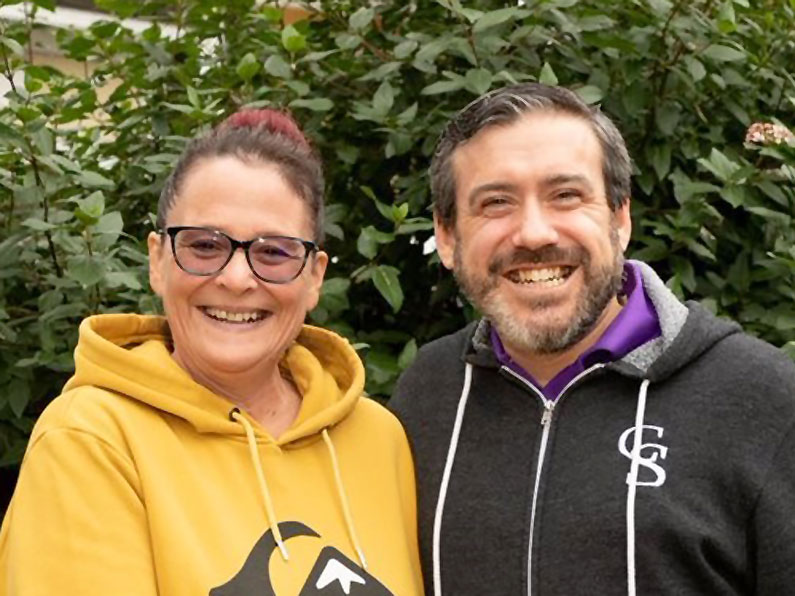
Fascinating Rhythm Gets Fully Rob-Mance-ipated
Fascinating Rhythm Gets Fully Rob-Mance-ipated
Fascinating Rhythm members spent the weekend of 22-23 January 2022 at The Greenfield Centre enjoying two days of intensive vocal coaching with Rob Mance, Musical Director of barbershop choruses Vocal Standard and Central Standard.
Fascinating Rhythm had planned to go away on a chorus retreat in April 2020 for an immersive coaching experience, but those plans had to be cancelled due to the covid-19 pandemic and lockdown. After spending more than a year meeting online before returning to in-person rehearsals, coming together for a coaching weekend felt like another step towards getting back to normality.
Getting to know you…
Fascinating Rhythm first met Rob earlier in the month when he visited one of the choir’s regular Thursday evening rehearsals to introduce himself and his innovative coaching approach. Rob is a professional singer, vocal coach, musical conductor and experienced Barbershop Harmony Society judge.
“What a joy to meet Jo and Fascinating Rhythm for the first time! After having to delay this trip a few times due to the pandemic, the anticipation for our meeting was high – and the chorus did not disappoint!”
Rob said.
Big journeys begin with small steps
Rob is a specialist in posture and vocal pedagogy. Throughout the weekend, he worked with individual chorus members to improve their singing posture and vocal technique. By encouraging each singer to make small adjustments to their technique, Rob was able to create a step-change in the ensemble chorus sound.
“After just a few minutes of coaching, we heard a huge difference to everyone’s sound – it was truly amazing!”
said Brenda.
Reflecting on the success of the weekend, Rob said, “A couple of things really stood out to me. First, the chorus was so ready and willing to try anything. This open and encouraging culture led to significant growth over our three days together. Second, their Musical Director, Jo, is a driven and dedicated leader whose attention to self-growth and the growth and nurturing of her singers is noticeable and admirable. I absolutely look forward to many more sessions with Fascinating Rhythm.”
What a difference a day makes!
Fascinating Rhythm’s Music Team were delighted, inspired and enthused by the new techniques and approaches Rob introduced.
“What a weekend – a great way to start the year off! It was an inspiring weekend of listening, supporting, participating and taking on board and embracing all the little tweaks to make your voice the best it can be. It was great to hear the difference it made to individual voices.”
Tenor Section Leader Ali.
“I’m sure I speak for the whole Bass Section when I say that it has been an absolute privilege to receive coaching from Rob Mance. The individual advice each of us has received will be invaluable in helping us work towards reaching our full potential.”
Bass Section Leader, Brenda
“What a truly revelatory weekend. What Rob showed us is that there is a really good singer lurking within us all – all we need are the correct techniques to let them out. Continuous practice will take us to the next level!”
Baritone Section Leader Wendy D.
“Rob Mance has totally inspired me to become the best singer I can be. He has also inspired the whole chorus to work together as a team to put all our new learnt tools into place. 2022 – bring it on!”
Assistant Director Wendy H
Fascinating Rhythm plans for 2022
Fascinating Rhythm members are looking forward to practicing and developing the new skills they have learned over the coaching weekend. With covid restrictions lifting, the chorus plans to compete in some music festivals and at the Ladies Association of British Barbershop Singers annual convention and have been asked to perform at the Keynsham Memorial Park later this year.
“The whole weekend was so interesting and informative. Rob’s coaching has given us all a tremendous boost of enthusiasm and the confidence to embrace the challenge of becoming the best singers we can possibly be. What an inspirational start to 2022!”
said Brenda.
“The buzz in the Tenor Section is amazing, and we already have plans to have a section rehearsal so that we can practice all the things we learned and achieved over the weekend. Awesome!”
said Ali.
Fascinating Rhythm’s Musical Director, Jo, had the final word.
“Well, I don’t think I have ever been left speechless before! It was an incredible weekend where personal investment in each singer was top of the agenda. Rob took such great care of everyone. It felt incredibly safe, nurturing and invaluable in moving us forward as an ensemble.”
Joining Fascinating Rhythm
If you are interested in joining a choir and would like to find out more about Fascinating Rhythm, please get in touch via our website.
Fascinating Rhythm is always on the lookout for new members, so if you are interested in taking up a new hobby and joining a choir in 2022, please get in touch via our website.
You can also find out more about what we do by following us on Facebook, Twitter and Instagram.
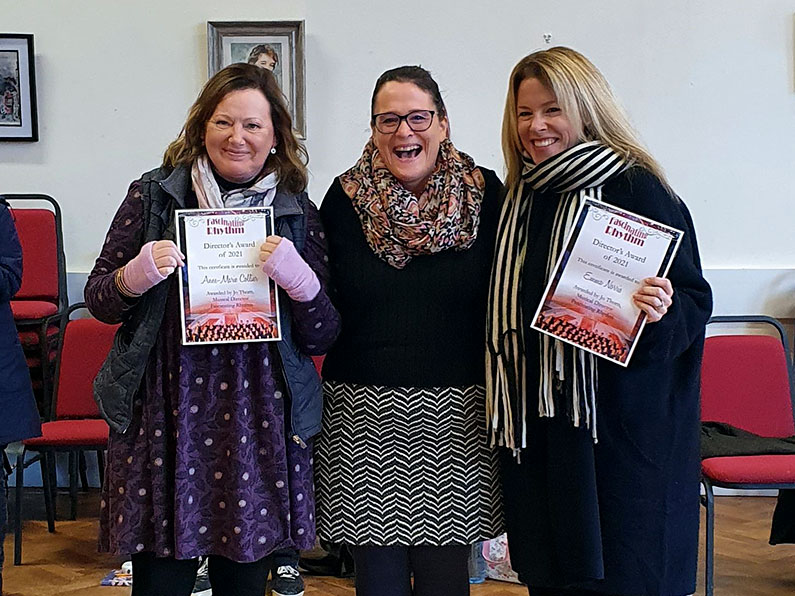
Fascinating Rhythm Reflects on the Successes of 2021
Fascinating Rhythm Reflects on the Successes of 2021
Fascinating Rhythm members gathered online on Thursday 20 January 2021 for their AGM and awards night celebration.
Fascinating Rhythm’s Chair, Iris, opened the meeting by reflecting on the highs and lows of rehearsals over the previous year – from the technical challenges of Zoom to the unexpected distractions of rehearsing outside and the long-awaited return to Fascinating Rhythm’s ‘home’ at the Greenfield Centre in Winterbourne.
Musical Director, Jo, titled her report of the year “making the most of it”. She reflected throughout her report that, despite the many challenges of 2021, as a chorus Fascinating Rhythm has not only survived but thrived during very difficult times – a true mark of the choir’s bond and culture.
Jo went on to congratulate Fascinating Rhythm’s two newest members, Lily and Hazel, on passing all elements of the assessment process and becoming fully-fledged members of the chorus.
Hazel said
“I am absolutely thrilled to have become a full member of FR. I’ve already learned so much, particularly in the workshop, and I am looking forward to continuing to develop as a singer, and being a part of the FR sound!”
Jo also welcomed Ella, who is in the process of joining the choir having previously sung with Junior FR.
In keeping with tradition, a number of awards were made in recognition of the hard work put in by members of the choir throughout the year:
- Kate B received the Chair’s Award for having undertaken a coronavirus risk assessment and developing a covid-19 policy to support a safe return to in-person rehearsals
- Anne-marie and Emma received the Director’s Award for their sterling effort in getting signed off on a huge number of songs from Fascinating Rhythm’s repertoire and their overall general attitude to our ‘work hard, play hard’ ethos
- Iris received the Members’ Award for stewarding the choir through the challenges of a second pandemic year
All members of the committee were re-elected and Fascinating Rhythm members voted for their charity of the year for 2022 to be Ups and Downs Southwest.
Looking forward to 2022, Iris said
“I’m excited about the year ahead. Now that we have taken the decision as a chorus to start rehearsing without masks we are taking another step back to normality. We are all looking forward to a year of less Zoom and more ‘in the room’, working on our craft and being able to have sing-outs again.”
How To Join Fascinating Rhythm
Fascinating Rhythm is always on the lookout for new members, so if you are interested in taking up a new hobby and joining a choir in 2022, please get in touch with our Membership Secretary via our website.
You can also find out more about what we do by following us on Facebook, Twitter and Instagram.
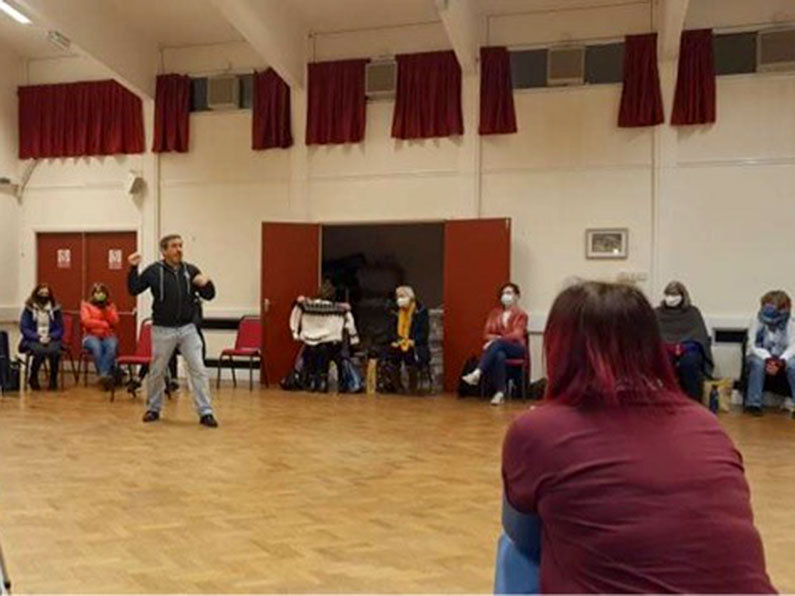
A fantabulous night to meet Rob Mance!
A fantabulous night to meet Rob Mance!
Fascinating Rhythm’s ladies started 2022 on a high, spending an evening with barbershop legend Rob Mance, who directs both the Sweet Adelines International affiliated ladies a cappella choir Vocal Standard and the Barbershop Harmony Society men’s chorus Central Standard.
Rob Mance is a professional singer, vocal coach, musical conductor, and an experienced Barbershop Harmony Society judge. He specialises in posture and vocal pedagogy.
Fascinating Rhythm hadn’t met or worked with Rob before, so the evening was spent getting to know each other, with the ladies singing through some well-loved songs and learning more about Rob’s coaching approach. By the end of the evening, the chorus was energised and ready for the work they will be doing with Rob during an intensive coaching weekend later this month.
Fascinating Rhythm’s Musical Director, Jo said,
“We feel so lucky to have managed to secure these sessions with Rob Mance – it has been two years in the making. Every group I know he has worked with has high praise for his approach and ensuing results. I know that we will gain a huge amount from our time together.”
Fascinating Rhythm had initially planned to spend a retreat weekend with Rob in April 2020, but the emergence of the covid-19 pandemic resulted in a change of plans and saw the coaching being postponed twice.
Following the introductory session on Thursday night, Fascinating Rhythm members are looking forward to a more in-depth coaching weekend with Rob on Saturday 22 and Sunday 23 January at the Greenfield Centre in Winterbourne.
Rob Mance is visiting the UK for ten days. Whilst he is in the Bristol area, Rob will also be working with local choruses Avon Harmony, Bristol Fashion, the Great Western Chorus, the ladies a cappella group RhythmMix, and barbershop quartets Specs Appeal, Off the Record and Sonic.
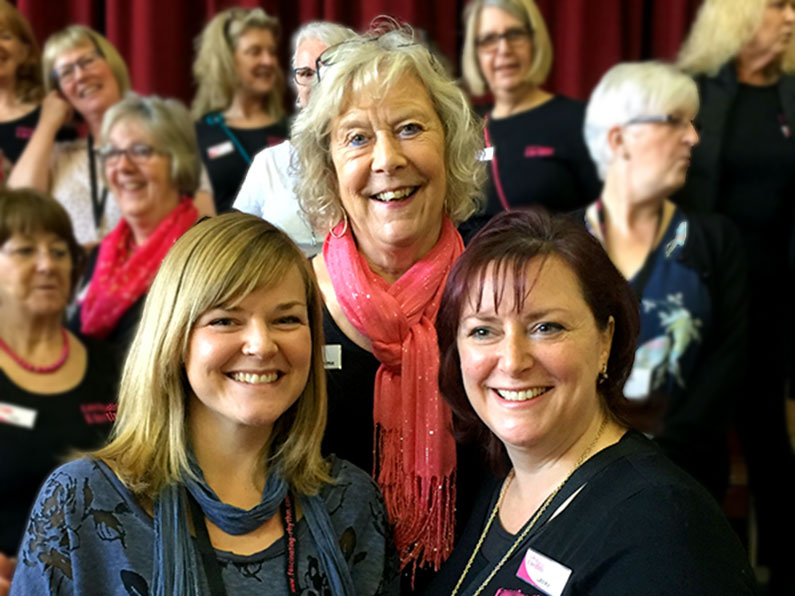
Fascinating Rhythm Insights 9: Singing is a Family Affair
Singing is a Family Affair
Fascinating Rhythm’s ladies often say that being part of a choir is a great way to make friends who become like an extended singing family. A love of singing and making music often runs in families, so we celebrate some of Fascinating Rhythm’s actual family connections in this article.
Lara and Marilyn – Singing is a Family Affair
Lara currently sings Tenor with Fascinating Rhythm. Her mum, Marilyn, sang Lead with the chorus in the early 2000s and, being a good seamstress, also enjoyed being a member of the Wardrobe Team.
“I was first introduced to barbershop when I was about 15 years old. My step-dad, Simon, sang with Thames Valley Chorus and Mum and I would go to rehearsals and performances to support him. I loved the choreography and the harmony,” remembers Lara.
When their family moved to Wiltshire, Simon joined the Great Western Chorus (GWC) in Bristol. At one GWC event, Lara and Marilyn were approached by GWC’s Musical Director, Linda, who asked if they did any singing and directed them to Fascinating Rhythm.
After passing their auditions (by singing ‘Happy Birthday To You’), Marilyn chose to sing Lead, and Lara joined the Baritone section. They practiced together in the car on the way to rehearsals and always went home on a high afterwards. They fondly remember the LABBS Conventions in 2003 and 2004 as particular highlights of their time singing together – especially the anticipation of waiting to go on stage and show the judges the Convention packages.
“When we joined Fascinating Rhythm, the chorus had about 23 members and was busy preparing for LABBS Convention – polishing their contest songs and trying on fancy frocks – the team spirit was amazing,” says Lara. “It was such a thrill to get up on stage for the first time. It was the most amazing adrenalin rush, and I’ve been hooked ever since!”
Marilyn continued to support Simon and the Great Western Chorus, travelling to the USA with them when they were British Association of Barbershop Singers Gold Medal winners but found she couldn’t continue with Fascinating Rhythm at the same time.
Lara went to live in America, which meant leaving Fascinating Rhythm for a while, but she has returned to the chorus, now she is settled back in the UK.
On singing with her family, Lara says, “Unfortunately, my daughter is not interested in singing at all, but my son did sing with a boys’ choir for a long time and loved it, so the singing genes went down the line in that direction. There was an occasion when I had both of my children up on stage to sing a Christmas carol with Fascinating Rhythm, which means there have been three generations of our family singing with the chorus for a brief, glorious moment!”
Di and Mads – Singing is a Family Affair
Di is a long-standing member of Fascinating Rhythm’s Bass section, and her daughter, Mads, sang Baritone with the chorus before branching out to establish her own singing career. They share a love of crafting and have both been members of the Wardrobe Team.
“I first saw Fascinating Rhythm sing as guests at a concert hosted by Dursley Male Voice Choir, which my husband had joined when we moved to Dursley from Wales. There was a fabulous afterglow in the pub afterwards. Having always been involved in amateur operatics and similar activities, I approached Jo to ask if she needed any more singers. She said yes, and I’m still here 11 years on!” remembers Di.
A year or so later, Di encouraged Mads to come and sing with the choir. “Mads was just finding her voice and needed to build her self-confidence – I knew Fascinating Rhythm could help her do that!” Di says. “I felt so proud to be able to watch her confidence grow and often had a lump in my throat when she was asked to sing a solo.”
“Mum had been a member for a while, and I’d seen a couple of the choir’s shows”, reflects Mads. “I’d always sung but never done anything in an ensemble before, and barbershop just seemed to be different to the usual options – plus it was a chance to spend time with Mum, especially as I no longer lived at home.”
Di and Mads agree that the best thing about joining Fascinating Rhythm was getting to spend more time together. They have particularly fond memories of the LABBS Conventions, especially the year the chorus came fifth in the competition and was awarded ‘Most Improved Chorus’ and Jo received ‘Most Improved Director’.
As well as singing as part of the chorus, Di and Mads also sang together in the quartet Free Range with Dot and Lesley. They agree that one particular highlight was the quartet’s trip to Spain to take part in the Spanish Association of Barbershop Singers Convention.
One special memory for Mads was being awarded ‘Singer of the Year’ with less than 2-years of service. “It may not seem much but, as someone who was so uncertain of my voice and capability, it gave me such a boost. In fact, Fascinating Rhythm continued to give me those boosts which eventually enabled me to have the music career I do today” she smiles.
Di and Mads agree that singing in a chorus is a hugely positive hobby and extol the virtues of being part of such a strong sisterhood. “Many of us have had tragedies and incredible high spots, and the support offered by these ladies is tremendous and unstinting. Chorus is a safe place to go and leave all your troubles at the door and really lose yourself in the creation of glorious music,” says Di. Mads agrees, “Fascinating Rhythm is the loveliest, most supportive and fun-loving group you could ever wish to meet. You will work really hard, but you will learn so much about the craft of singing and performance and yourself in the midst of that. It taught me to enjoy rather than fear performing, and that has had a wide-ranging influence on other areas of my life since – for the better!”
Follow these links to watch Mads performing her debut single; The Heart Has A Thousand Tongues, and the follow-up, Black Cat.
Lesley and Thelma – Singing is a Family Affair
Lesley has been a member of Fascinating Rhythm for 25 years. She is Assistant Section Leader for the Lead section and has sung in various quartet line-ups. Her mum, Thelma, sang Bass with the chorus and was an active member of the Wardrobe Team for many years.
After seeing a leaflet advertising a local singing group, Lesley and Thelma joined Fascinating Rhythm. Thelma had recently moved closer to Lesley and had been involved in amateur dramatics in her old village, so the pair thought they’d give singing a go! They started out singing Lead and had to speed-learn the repertoire so they could sing with the chorus at a garden party concert six weeks later!
“The best thing about singing with Mum was sharing a passion for the same thing. That was a really special thing for us, especially the quality time together when we had weekends away for LABBS Conventions,” reflects Lesley. “We don’t really share any other hobbies other than the enjoyment of gardening, which is being passed down to my daughter.”
Lesley and Thelma have many special memories of their time together with Fascinating Rhythm, particularly the many Conventions they attended – sharing a room, enjoying some great afterglow parties and staying up into the wee small hours!
“I remember one year when my quartet Free Range competed at Convention. We put our heart and soul into our performance. To see the pride on Mum’s face when we came off stage was so lovely,” says Lesley.
Lesley’s daughter, Abi, also joined Fascinating Rhythm for one of the chorus’s Learn To Sing workshops, which meant three generations of the family singing together that day.
“It was such fun and exciting, but sadly, Abi didn’t get bitten by the singing bug!” muses Lesley.
Thelma decided to retire from singing in 2020 and was awarded honorary membership for her long service to the chorus. She often talks about Fascinating Rhythm and visits when she can – even joining one of the choir’s Zoom social evenings during the lockdown.
“I’d encourage anyone who is thinking of joining a choir-like Fascinating Rhythm to just do it! You may fall in love with the joy of singing, and it could become a big part of your life. I’ve been part of Fascinating Rhythm for over 25 years now, and my children have grown up with their Mum and Nan singing barbershop – it’s been part of their lives too!” says Lesley.
Jo and Linda – Singing is a Family Affair
Fascinating Rhythm’s Musical Director Jo has been singing barbershop since she was 12 years old. She is lucky enough to have sung with her mum, Linda, and her Grandmother, Irene!
“As a family, our barbershop roots stretch right back over three generations, with both of my grandparents being heavily involved, so I guess there was no escape!” Jo laughs.
When Jo joined Fascinating Rhythm in 2004, Linda was taking a break from singing to care for Jo’s dad. Eventually, Jo persuaded her mum to come and join the chorus, and they sang Baritone together. Linda became Baritone section leader, a role she held for many years. She was there to support Jo when she transitioned from being a singing member of the chorus to Musical Director.
Being part of Fascinating Rhythm allowed Jo and Linda to share their love of singing and passion for barbershop. The opportunity to sing together for so many years helped to create a special mum-daughter bond, including laughing over the wrong (sometimes rude!) song lyrics and crying during songs with personal meaning, and spooking each other out when harmonising because their voices are so similar. Although Linda now lives too far away to sing with the chorus, she and Jo have lots of great memories and plenty of YouTube clips to reminisce over when they get together.
“It was so great to share our love of singing and benefit from proper catch-up time in the journeys to and from chorus rehearsals. We are both baritones at heart, and Mum has the best baritone voice and work ethic ever!” reflects Jo. “When I became Musical Director, I would frequently catch Mum’s eye during rehearsal, and I could tell by that silent communication that I was doing okay.”
Sarah and Lily – Singing is a Family Affair
Sarah sings Baritone with Fascinating Rhythm (and occasionally dabbles with singing Lead). Her daughter, Lily, recently joined the Baritone section, having sung previously with Junior FR.
Sarah joined Fascinating Rhythm after she was asked if she could sing by a member of the Great Western Chorus. Initially, she went to a Learn To Sing day in January 2014 and loved it. Then, she came along to a rehearsal six months later and passed her audition three weeks after that.
“I’d heard the Great Western Chorus sing and seen the quartet Havoc. Then, I discovered that Vanessa (who I knew through my elder daughter) was in Fascinating Rhythm, and she told me about the Learn To Sing day. I went along, and someone there told me I had a ‘very barbershop face’!” remembers Sarah.
Lily started coming along to watch Fascinating Rhythm rehearsals with her mum. She began singing with Junior FR when Sarah was involved in directing their production of ‘Cinderella’ and took part in the following year’s show, “Little Red Riding Hood’, for which her mum made her dress up as a Land Girl and danced the Charleston!
“I went to my first LABBS Convention when I was nine years old. I watched all the quartets and gave them marks. I loved it and have been every year since,” says Lily.
Sarah and Lily love singing in the Baritone section together, and they help each other learn and practice songs between rehearsals.
“It’s brilliant because Lily is better than me and will help me learn. Plus, she knows how to download the teach tracks to her phone, so I’m hoping she’ll do mine too!” says Sarah.
If you are thinking of learning to sing or joining a choir, Fascinating Rhythm can give you a warm and friendly welcome. You can even bring a family member along for support!
To find out more about joining Fascinating Rhythm, please get in touch via our website. You can also follow us on Facebook, Twitter or Instagram.
You might also like to see other articles in the Fascinating Rhythm Insight series:
01 – Why singing is good for you
02 – Making your performance authentic
03 – Performance through vocal expression
04 – Teamwork makes the dream work
05 – Why warm-up?
06 – The new members’ guide to joining a choir during a pandemic!
07 – Breathing to Sing
08 – Junior FR: how it started / how it’s going
10 – How we choose Convention songs
11 – Mixing it Up
12 – Love to Sing

Junior FR’s Tenth Anniversary Celebration Concert
Junior FR’s Tenth Anniversary Celebration Concert
Junior Fascinating Rhythm (Junior FR) has celebrated its tenth anniversary by hosting a special concert. The full-house audience was made up of Junior FR girls’ parents and grandparents, ex-Junior FR students with their families, and several Fascinating Rhythm members.
The evening concert, held on 4 December 2021 at Iron Acton Village Hall, featured Junior FR’s current line-up singing several chorus numbers and several soloists and duettists who have previously represented the choir at Eisteddfods and singing competitions. The celebration featured some of Junior FR’s newest and best-loved songs and saw all current and former singing members reunited for a moving rendition of ABBA’s song ‘Thank You For The Music’.
To mark the occasion, Wendy Howse, Junior FR’s Musical Director, was presented with a special commemorative framed ‘family tree’ picture showing the name of each of Junior FR’s current and former members. The founding members and adult helpers on the lower branches and newer members and helpers towards the top. The adults who have supported Junior FR as ‘helpers’ over the past ten years were presented with smaller versions of the tree to recognise their contribution.
“It was an amazing evening, full of joy and celebration. The absolute highlight was having every Junior FR member, current and past, on stage to sing ‘Thank You For The Music’. The sound was immense, and my grin was even wider! “
Wendy House
“It was such a privilege to be sitting in the audience for this very special concert and an even greater honour to be invited to direct one of their songs ‘This is Me’. It is so evident by the whole polished performances through the evening just how hard the girls work not only in rehearsal but on their own at home, true dedication.”
Fascinating Rhythm’s Musical Director Jo Thorn.
The concert concluded with a retiring collection, which, together with other fundraising activities, raised approximately £500 for the Jessie May Trust.
“I will be buzzing for weeks after this event, and I can’t wait to see what the next ten years have in store for Junior FR.”
Wendy Howse
Joining Junior FR
Junior FR is currently recruiting new members, so if you, or someone you know, is interested in taking up singing or joining, please contact us via our website.
Junior FR is a choir for girls aged 7 to 16 years old. There is no audition process for new members, and no previous singing or musical experience is needed. Members meet weekly during term-time at Iron Acton Village Hall (Friday afternoons, 4.00-5.30pm), perform at events throughout the year and help to raise money for various charities.

Fascinating Rhythm Insights 8: Junior FR how it started/how it’s going
Junior FR how it started/how it’s going
Junior FR, Fascinating Rhythm’s junior choir for girls aged 7 to 16, is celebrating its tenth birthday this year. We caught up with Musical Director Wendy and some of Junior FR’s founding, current and former members to reflect on how the choir got started and reminisce over their ‘best bits’ from the past ten years.
We’ve come a long way
Wendy (Junior FR Musical Director): “The idea for a junior choir came about when we were planning a Christmas concert and looking for acts to include alongside Fascinating Rhythm on the programme. Four of the ladies’ chorus members (Caroline, Kitty, Sharon and I) all had daughters of a similar age; we thought we could sing together with them at the concert, and the idea for Junior FR was born.”
Kitty (Junior FR helper): “I felt so proud standing on stage with my daughter, Holly, in front of Fascinating Rhythm, at that first Christmas concert. And my mum was there too, accompanying us on the piano, so we had three generations of our family performing together!”
Wendy: “Our very first rehearsal was on a Saturday morning in early October 2011 in Iron Acton Village Hall with just 12 singers. Over the next few years, Junior FR grew to a membership of about 30 girls from across the South Gloucestershire area. Unfortunately, due to the covid-19 pandemic and lockdowns, we’re down to 22 members at the moment.”
We’ve had success
Wendy: “Junior FR regularly performs at local concerts and festivals and has won the under-11s choir category in Thornbury Eistedfodd three times. We’ve also had girls sing solos and duets in music competitions.”
Caroline (Junior FR helper): “I love the ‘wow!’ reaction that Junior FR gets when they sing with or for Fascinating Rhythm. It feels like a validation of just how good they are.”
Kitty: “I love the joy and satisfaction of being part of a great team that provides such rewarding experiences for the girls and seeing the confidence and self-esteem they gain from being part of Junior FR.”
Georgia (former Junior FR member): “Most importantly, Junior FR taught me the power of singing and music, and I definitely wouldn’t be as confident if it weren’t for the many things we were taught each week. Starting as a group that wanted to introduce young girls to singing specifically in harmony has taught me so much more. I adored being on stage with Junior FR and all of the wonderful ladies who run it, and it is eight years of my life I will always look back on with so much joy and treasure forever.”
Wendy: “I’ve had so many amazing comments from parents over the past ten years of Junior FR. They tell me how being part of the choir has increased their girls’ confidence. All the girls who have come through Junior FR have grown in confidence and enjoyed being part of our choir. It’s such a special time because the girls come from different areas and don’t all go to school together, but when they meet up, there’s a real sense of family.”
We’ve had good times
Kitty: “One of my best bits has been the fun and laughter with all the girls in adapting and staging our shows,’ Cinderella’ and ‘Little Red Riding Hood’.”
Lily (former Junior FR member): “I was about eight years old when I joined Junior FR. I went with my mum, Sarah, because she’d been asked to help direct ‘Cinderella’ and I got a part in the chorus. The next year, mum directed ‘Little Red Riding Hood’, and she made me dress up as a pig in a Land Girl outfit to sing and dance the Charleston!”
Elizabeth (current Junior FR member): “In ‘Little Red Riding Hood’, I got to play Sniffy the dog and eat half a cake! I like being part of Junior Fr because it’s fun.”
Anna (current Junior FR member): “One thing I always remember is how happy I was when Jo, Musical Director of Fascinating Rhythm, gave me some chocolates at my first Proms in the Meadow, because she could see in rehearsal I was way out of my comfort zone singing with the ladies’ chorus, but I had tried hard. I was probably seven years old then. I’m now 14, still with Junior FR and have learned so much! Performing at Proms has always been my highlight.”
Georgia: “I loved Junior FR so much because it introduced me to singing and, from the first-ever rehearsal, I knew that I had friends for life. Junior FR became my second family and gave me so many opportunities, the majority of which I wouldn’t have been able to experience without joining Junior FR.”
Caroline: “It was a bit like herding cats sometimes, trying to get the girls to focus or contain their excitement before a performance! But as soon as they were on their way to the stage, then performing, they were brilliant. I always felt immensely proud watching Junior FR or singing alongside them.”
Mama Joan (Junior FR helper): “Helping with Junior FR has given me a great deal of pleasure over the years, and I’ve enjoyed every minute – from the very first Learn to Sing day at Yate Academy to the shows, Eisteddfods and concerts.”
We’ve reached so high
Layla (current Junior FR member): “I remember when I used to look up to the older girls and think how ‘cool’ they were. They were always sat in a specific part of the room. Now I’m one of the seniors, and I look at the juniors, knowing they will carry on Junior FR and be one of the cool seniors too, one day.”
Caroline: “My daughter, Imogen, and I fondly remember Wendy’s energy, enthusiasm and fantastic teaching skills. We both learnt a lot of singing and performance craft through Junior FR, and I even improved my range on higher notes because the girls naturally sing in a higher range!”
Mama Joan: “Wendy has created a wonderful resource for young girls, and I feel privileged to have been a part of it. All the Junior FR girls are so wonderful – it has been lovely to see many of them grow into confident young women and accomplished singers.”
Wendy: “During the lockdown, Junior FR put together a video ‘Being a Kid in Lockdown Too‘, which was a lot of fun to learn and record! Then, at the beginning of this year, when we were locked down again and rehearsing on Zoom, we had the idea of doing a musical show. The girls chose ‘The Pied Piper’ and started learning all the songs. We were hoping to do a live performance but decided instead to make it into a musical film! The girls have been working really hard to record the soundtrack and film on location. We’re just adding a few finishing touches and will be ready to release the Premiere soon – so, watch this space!”
And we hope for more…
Wendy: “We’re planning a big tenth-anniversary celebration in December with current and former members of Junior FR, their parents and members of Fascinating Rhythm.”
Caroline: “I’ll always continue to follow Junior FR with pride and happy memories.”
Mama Joan: “Congratulations, Junior FR, on your 10th birthday! I will always remember, with great fondness, the years I was privileged to be involved and all the lovely girls I met.”
Jo (Fascinating Rhythm Musical Director): “We are so proud of JFR and all their achievements over the last ten years. They always steal the show when they join Fascinating Rhythm for a concert, and that makes us all incredibly happy. We are once again reminded of the power of belonging to a like-minded community, and I know that these girls will treasure their time with Junior FR for a lifetime. We hope many of them will join Fascinating Rhythm when they come of age; no better way to future-proof our group than with well trained, confident and passionate young ladies.”
Sure is good to be here
If you or someone you know would like to join Junior FR, please get in touch with us via our website.
You might also like to see other articles in the Fascinating Rhythm Insight series:01 – Why singing is good for you
01 – Why Singing is Good For You
02 – Making your performance authentic
03 – Performance through vocal expression
04 – Teamwork makes the dream work
05 – Why warm-up?
06 – The New Members Guide to Joining a Choir in a Pandemic!
07 – Breathing to Sing
09 – Singing is a Family Affair
10 – How we choose Convention songs
11 – Mixing it Up
12 – Love to Sing
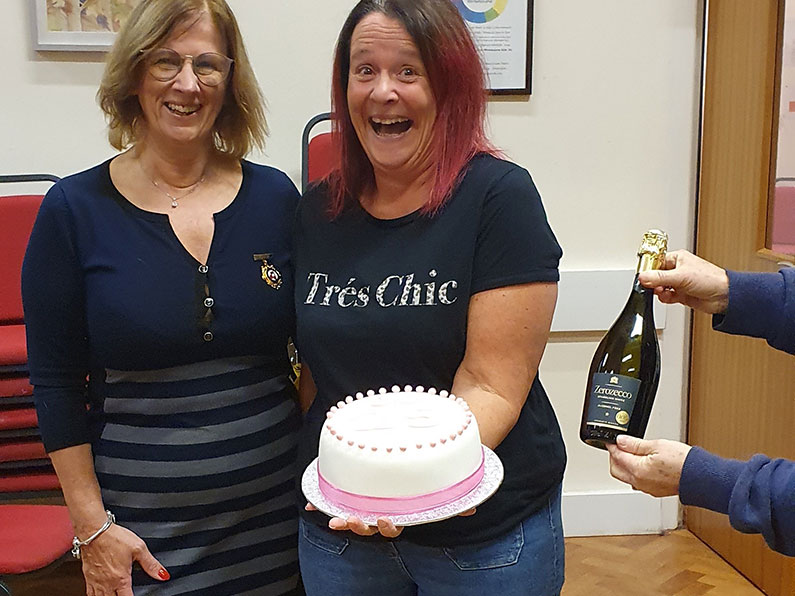
LABBS Chair visit to Fascinating Rhythm
LABBS Chair visit to Fascinating Rhythm
Fascinating Rhythm members were delighted to receive a visit from Natalie Feddon, Chair of the Ladies Association of British Barbershop Singers (LABBS), who travelled all the way from Bromley in Kent to attend their rehearsal on Thursday night at the Greenfield Centre.
Fascinating Rhythm’s Musical Director, Jo, invited Natalie to join in with an energetic rehearsal warm-up and a joyful rendition of two popular LABBS ‘polecat’ songs – ‘Lazy Day’ and ‘Anthem’.
Natalie thanked the choir for a warm welcome and complimented Fascinating Rhythm on their video of ‘This Is Me’, which had been shared with other LABBS choruses as part of this year’s Unconventional Convention. Natalie said that the message behind the song, which Fascinating Rhythm had recorded to support the charity Ups and Downs Southwest, was relevant to people in all walks of life and was a strong anthem for singers to celebrate their individuality.
Natalie said,
“It is a privilege to visit LABBS choruses and to join in their singing. It is great that we all know the polecat songs and can share our enjoyment of barbershop harmony. Singing makes me feel so happy, and I am so proud to be LABBS Chair. Hearing the diversity of Fascinating Rhythm’s music and the standard of their singing has been a real joy this evening.”
Natalie then surprised Jo by presenting her with a Long-Service Award in recognition of her 25 years membership of LABBS. Jo is a third-generation barbershopper and the fourth member of her family to be a chorus director. Having taken up singing at a young age, Jo has sung in three choruses and two quartets and has won bronze, silver and gold medals with her quartet Havoc.
Jo said,
“What a milestone! Does it make me feel old? Hell no. Any time spent with LABBS keeps you young at heart, forever learning, and continuously creative. Thank you, LABBS, for all the incredible opportunities and thank you, Natalie, for being part of this momentous occasion. But the biggest thanks to my beautiful chorus Fascinating Rhythm for the last 15 years, where you have pushed and supported me to be the very best version of myself. Believe me when I say that actual directing skills only add up to 5% of a Musical Director’s job. Barbershop is my life, and I love it.”
Fascinating Rhythm helped Jo celebrate her achievement with a few glasses of Prosecco and a cake, baked especially for the occasion by chorus member Julie.
Other Fascinating Rhythm members receiving awards and commemorative pin badges this month are Bekki and Linda, who have both been members of the choir for five years.
Fascinating Rhythm’s Chair, Iris says,
“We spent a wonderful evening with LABBS Chair, Natalie. It’s great that she was able to visit and sing with us and help celebrate our ladies’ commitment to close-harmony barbershop singing.”
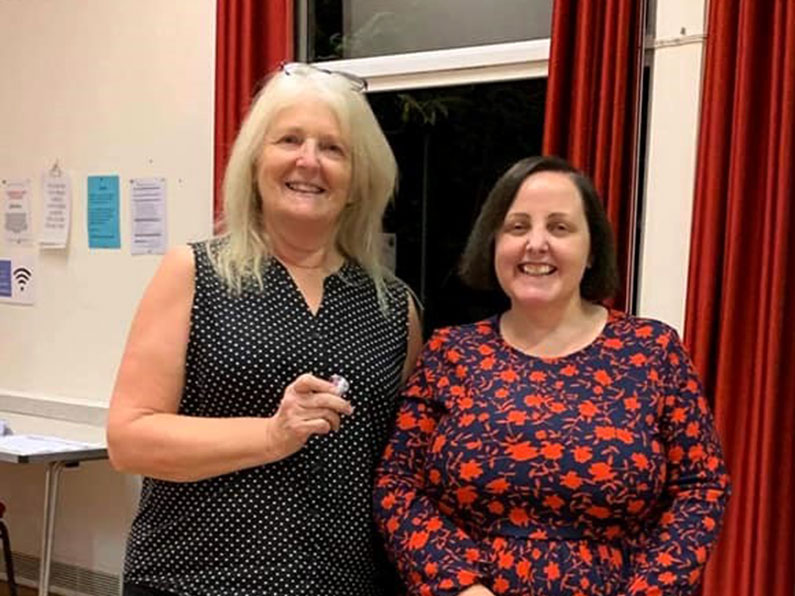
Fascinating Rhythm celebrates membership milestones!
Fascinating Rhythm celebrates membership milestones!
Fascinating Rhythm has been marking the long service of several chorus members and welcomed a new member to the risers.
During October, membership awards and commemorative pin badges were presented to:
- Lesley and Ali who have been members of Fascinating Rhythm for 25 years
- Fascinating Rhythm’s Musical Director, Jo who has been with the chorus for 15 years
- Chloe, Julie, Angela and Kate who have all been members of the chorus for ten years
- Hannah and Susie who have both been members for five years
Earlier this year, Ali also received a 35-year membership award from the Ladies Association of British Barbershop Singers (LABBS).
“It’s wonderful to celebrate and recognise members dedication to Fascinating Rhythm over the years,”
says Committee Chair Iris.
“We are looking forward to seeing them wear their membership pins with pride and to many more years of singing together!”
Fascinating Rhythm has also congratulated new member Hazel on passing the first stage of our assessment process just a few weeks after coming along to her first rehearsal.
“Now that the pandemic restrictions have lifted, it’s so wonderful to be singing again,”
says Hazel.
“I am really looking forward to performing with Fascinating Rhythm and developing my skills as a singer.”
“We feel so lucky to have new members joining us after 18 months of being locked down in every respect,”
says Jo
“It always fills me with pride to see new members immerse themselves so quickly into our chorus life. Hazel has confidently thrown herself into rehearsal nights, and it is such a pleasure to have her on board.”

Singing Success for Specs Appeal
Singing Success for Specs Appeal
Fascinating Rhythm is celebrating the success of one of its in-house quartets, Specs Appeal, at the Bournemouth Music Competitions Festival held at the beginning of October.
Specs Appeal were awarded a distinction and the Peter Carpenter Cup in the ‘Vocal Trio, Quartet or Ensemble’ category for their performance of a four-part arrangement of “Anthem” from the musical Chess and a bespoke arrangement of “Landslide” by Stevie Nicks.
Specs Appeal also competed in the Barbershop category, alongside six other quartets. They were commended on their entertaining performance of “A Dress With Pockets” and “Will You Still Love Me Tomorrow”.
“We were delighted to receive fantastic feedback from the adjudicator, as this was our first time in the competition,”
said Hannah, Amy, Becky and Kate.
“We love singing, together and to have our hard work validated just feels fantastic!”
At the beginning of last year, Specs Appeal were rehearsing hard for LABBS Quartet Prelims, but the competition was cancelled due to the coronavirus pandemic. During the lockdown, the quartet kept themselves motivated in weekly Zoom rehearsals and learned a special lockdown song, “I Might Just Hold You A Little Too Long”.
Whilst they still aspire to compete at Prelims in the future, Specs Appeal is currently working on some new a cappella close-harmony pieces arranged in a non-barbershop style. The ladies also plan to share a video of themselves singing “Landslide” as part of this year’s Ladies Association of British Barbershop Singers (LABBS) ‘Unconventional Convention’.
“We are so proud of Specs Appeal; what an achievement,”
said Jo, Fascinating Rhythm’s Musical Director.
“You will not find a more dedicated quartet who I know work incredibly hard on their art; this is so well deserved. Singing in quartet brings about a great level of confidence in one’s own singing and performance ability, and through their passion and quartet commitment, Fascinating Rhythm gains in every respect. Well done, ladies, amazing job!”
Specs Appeal formed as a quartet in April 2018, having sung together as members of Fascinating Rhythm. Amy (Lead), Becky (Baritone), Hannah (Tenor) and Kate (Bass) love singing a cappella and barbershop arrangements of popular songs. Embracing their stylish eyeglasses and feminist tendencies, they’ll take every opportunity to dress in matching spectacles-themed attire and keep things in their pockets.
Specs Appeal have entertained audiences at Westonbirt Arboretum’s Enchanted Christmas, sung in St Martin’s Church, Knowle with the Great Day Choir, and supported Fascinating Rhythm at a concert to raise funds for Thornbury Area Youth Music.
To find out more about Specs Appeal, you can follow them on Facebook.
If you are interested in forming or joining a barbershop quartet, you can find out more on the Ladies Association of British Barbershop Singers (LABBS) website
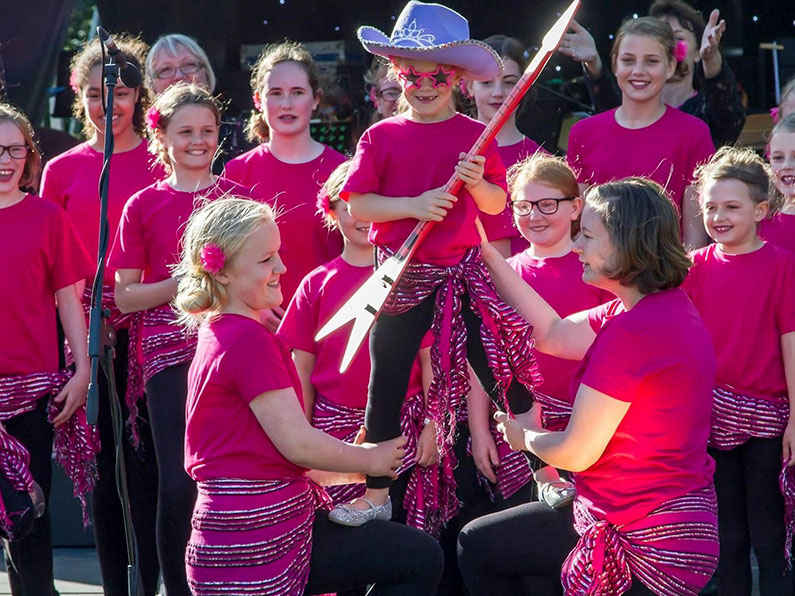
Ten Years of Junior FR
Ten Years of Junior FR
Fascinating Rhythm is celebrating the tenth birthday of its junior choir (Junior FR) this month.
To mark the occasion, Junior FR is rehearsing for a special 10th-anniversary concert, which will be held on 4 December 2021 and welcome back some former members. The show will feature the current choir line-up, plus some soloists and duettists who have sung at previous Eisteddfods. The concert will be free entry but with a retiring collection for the Jessie May Trust.
Junior FR was established in October 2011, with sixteen founding members (twelve girls and four adults). Since then, it has flourished to a membership of up to 34 singers, aged between 7 and 16 years old, from across the South Gloucestershire area. They rehearse under the direction of Musical Director, Wendy, supported by volunteer singing assistants from Fascinating Rhythm.
“Junior FR is such a special choir because the girls all come from different areas. They don’t all go to school together but, when they meet up, there’s a real sense of family,” explains Wendy. “Being part of Junior FR builds up their confidence, and they make new friends.”
Zoom Choir
Even when the covid pandemic disrupted daily life, school and rehearsals, the girls continued to meet on Zoom. They took the opportunity to work on solo performances, learn some new songs and put together their own Junior FR lockdown video: ‘Being a Kid in Lockdown Too’. Since then, the girls have been working on a musical video, recording a soundtrack and filming on location – watch out for the Premiere coming soon!
“Junior FR are a dedicated bunch of girls, who just love to sing!” reflects Wendy. “Despite all the upheaval of the past two years, they’ve kept practising at home to maintain their high standard of singing. I’m so proud of each and every one of them for their commitment and resilience.”
The beginnings
The idea for a junior choir first came about when Fascinating Rhythm’s Show Team was looking for another choir to include on the programme for a Christmas concert. Eight chorus members with daughters of a similar age suggested a ‘mums and daughters’ segment at the concert, and, from there, Junior FR was born.
Over the last ten years, Junior FR has put on musical shows, competed in singing competitions and performed at local events, such as the Iron Acton Proms in the Meadow. They usually take part in The Big Sing at St Peters Church, Frampton Cotterell, in support of Christian Aid and have entertained Christmas shoppers at Clifton Down Shopping Centre to raise money for charity.
Junior FR girls are encouraged to consider moving up to Fascinating Rhythm when they are old enough and, earlier this year, Lily Hopkins became the first person to do so. Lily joined Junior FR in 2015 and has supported Fascinating Rhythm at various concerts and competitions since she was seven years old.
“I’m absolutely delighted that Lily has chosen to carry on her singing with Fascinating Rhythm after being a committed Junior FR member,” says Wendy. “Junior FR girls are all part of our Fascinating Rhythm family, and we would love for any of the older members to come along to the senior choir.”
Find out more about Junior FR
Junior FR is a choir for girls aged 7 to 16 years old. There is no audition process for new members, and no previous singing or musical experience is needed. Members meet weekly during term-time at Iron Acton Village Hall (Friday afternoons, 4.00-5.30pm). They perform at events throughout the year and help to raise money for various charities. New members are always welcome – please get in touch with us via our website.

